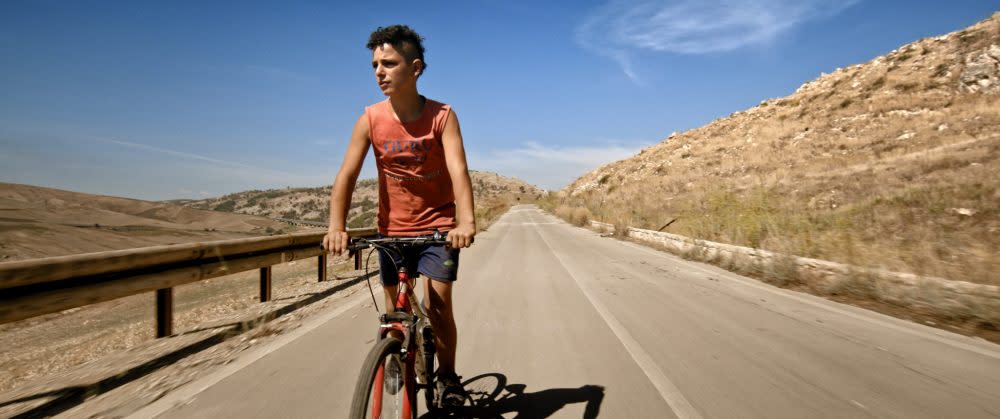‘Il Mio Corpo’: Cannes Film Review

Click here to read the full article.
Oscar is a Sicilian teenager with the tough-guy mohawk of a rebel and the shy, rare, dimpled smile of a child. Stanley is a handsome young Nigerian immigrant, his short hair worn in locs, who insists on saying grace before the home-style meals he prepares: banku, fish stew. Oscar grudgingly helps his father and brother grub a living for the family, scavenging for scrap metal; through his connection to the parish priest, Stanley gets casual jobs harvesting grapes and herding sheep. The two protagonists of Michele Pennetta’s beautiful, quietly scorching documentary have nothing in common except, maybe, everything: they share a kind of looming futurelessness, a melancholy awareness of the inescapability of their hard, poor circumstances and a reliance on the forbiddingly arid landscapes of economically ravaged Sicily to provide a living.
This is the third of Pennetta’s projects to deal with life on the fringes of solvency and legality in contemporary Sicily, after the Locarno-awarded short “A Iucata” which was about clandestine horse racing and the mid-length “Pescatore di Corpi” which followed a group of fishermen aboard an illegal fishing boat. Pennetta’s graceful, 80-minute third film, selecetd as part of Cannes’ ACID selection, feels like a culmination in more ways than just length, as it also finds his aesthetic philosophy at its most refined. The quietness of the approach — — coupled to the atmospheric lyricism that infuses Paolo Ferrari’s wonderful cinematography, creates a potent, sometimes transcendent whole that continues settling on you and expanding within you long after the film ends.
Pennetta and his editors Damian Plandolit and Orsola Valenti alternate between the two separate lives, in a rhythm that makes for contrast and comparison, with their differences illustrating just how varied the experience of poverty can be, just how many different sour flavors it comes in, and their similarities coming through in those unforced moments when their lives chime, when the sine waves of their existences come briefly into phase. Oscar dozes against the window of his father’s truck en route to a hillside dumping site; later, Stanley is jerked awake when his late-night bus goes over a bump. Oscar’s interactions with his father and brother Marco are almost all characterized by one of them offhandedly threatening to kill the other; Stanley bickers with his friend and flatmate Blessed, who is awaiting the results of his own visa application, joking that he’s poisoned the evening meal.
There are moments of pleasure, promise and airy freedom, like when Oscar freewheels on his bike in one long, ecstatically unbroken take and when Stanley plays basketball with Blessed or works up a sweat on the dance floor or goes swimming in the sea, the pale, clear water sluicing over his brown shoulders. And there are similar pains mentioned in passing: Stanley’s mother left him to be raised by his father, while the circumstances of Oscar and Marco’s motherlessness are revealed in a deeply uncomfortable kitchen-table scene, in which the boys’ guilt and their father’s bitterness is written loudly across every awkward silence.
During moments of striking domestic authenticity like that, it’s almost impossible to believe there was another person present, let alone a relative stranger wielding a camera. It gives the impression of Pennetta somehow erasing himself from the scene, as he observes from some invisible vantage point the non-sequiturs, worn-through jokes and secret codes of resentment that naturally exist between family members or close friends. And furthermore, he lets those moments speak for themselves, never underlining or forcing meaning on to them, trusting the audience enough to know that not everything has to be explained to be understood.
It’s the privilege of being so deep inside these private lives that allows Pennetta his liberties with formal documentary “truth.” When Oscar and Stanley’s stories eventually intersect, it’s in a wordless sequence that has to have been staged, and yet feels like a logical extension of the uncannily intimate mood. Perhaps the encounter — the briefest moment of mutual solidarity, a short-lived confederacy of the dispossessed — is a dream. It certainly feels dreamlike, this tiny flare of hope amid the bleakness of these parched ochre mountains, a few kilometers and a million miles away from tourist Sicily. Like Oscar salvaging an undamaged plaster Virgin Mary from the trash, or Stanley swabbing the marble floor of a church in return for groceries, within the hardship the film illustrates, there is a devotional aspect. As the choirs of Pergolesi’s “Stabat Mater,” the only music used, swell over the end credits, it compounds the feeling that “Il Mio Corpo,” for all the harsh realities it observes, is being offered up like a prayer, blown like a wish made on the fluff of dandelions, or some other weed that can grow, against the odds, where little else does.
Best of Variety
Sign up for Variety’s Newsletter. For the latest news, follow us on Facebook, Twitter, and Instagram.

